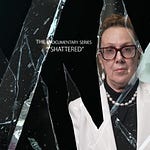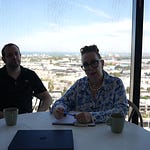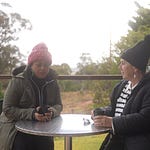Rosemary McKenzie -Ferguson is a trail blazer but for reasons none of you know. First injured in 1994 and long out of the Workers’ Compensation System she has been fighting for close to 30 years for the rights and acknowledgment of the injured workers’ community. She’s been spoken about, dismissed and then dismissed some more, but one thing is a given, her LinkedIn “Monday Muses” weekly newsletter is read by thousands of decision makers in the insurance sector because they know that Rosemary knows what they are all up to. Why? She’s worked for years with thousands of injured in probably the only ‘informal’ ‘unsupported commercially’ community for lived experience. Why? It’s all by design. Why have a system where the injured have a voice that is heard? That’s the level of abuse this system degrades to…
So what is this all really about? It is about the dehumanization of the injured by design.
There’s something deeply human about being called by your name. It’s the first acknowledgment of your existence, your identity, your story. And yet, across Australia’s Workers’ Compensation systems, quietly and systematically, injured workers report something chilling:
Case workers aren’t allowed to use their names.
Instead, they are referred to in case files, in calls, and in meetings by numbers, claim IDs, or generic identifiers like "the claimant" or "the worker."
And when the system speaks of them, it’s always with blame.
She didn’t follow process.
He’s difficult.
They’re exaggerating.
She’s not cooperating with her recovery.
Every sentence is a verdict. Every interaction another nail in the coffin of your credibility. There is no room for what happened to you—only what the system wants to believe about you.
This isn’t bureaucracy. This is dehumanisation by design.
And it’s not just cruel, it’s a red flag. A signal. A symptom of system collapse.
But What Does a System Collapse Look Like?
We tend to think of collapse as loud and sudden—riots, revolution, buildings crumbling. But most systems don’t fall apart with a bang. They rot quietly from within. They unravel in the moments no one sees as important. Like when workers become case numbers. Or when the default assumption becomes: you did this to yourself.
History tells us this.
The Soviet Union’s Bureaucratic Breakdown
In the final years of the USSR, people still showed up to work. The trains still ran. But the system had already collapsed in practice. Institutions couldn’t solve problems. Blame replaced truth. Citizens were surveilled, not supported. Information became so warped that officials believed their own lies. Sound familiar?
The U.S. Veterans Affairs Scandal
Between 2000–2010, thousands of veterans in the U.S. reported delayed or denied care. They became statistics, lost in layers of paperwork. Some died waiting for appointments. Many more were gaslit into silence. The response? Protect the system, not the people.
Australia’s Robodebt Scheme
Automated debt notices. No verification. Thousands of Australians accused of owing money they didn’t. Some took their own lives. The system continued for years before the truth came out. And even then—who was held accountable?
Workers’ Compensation Is Not ‘Failing.’ It’s Collapsing.
When a system:
No longer listens to the people it’s meant to serve,
Delegitimizes their suffering,
Prioritizes profit or policy over humanity,
And forces its own employees to participate in acts of harm (like refusing to use a person’s name)...
Then we are not looking at an underperforming institution. We are staring directly into a system in moral freefall.
This isn’t just bad practice. It’s a violation of dignity.
This Is What We Must Name
Calling someone by their name is a basic act of recognition. Of respect. Of saying, I see you.
So when a system instructs its workers to never say your name, it’s no longer about efficiency or objectivity. It’s about erasing your personhood to make it easier to hurt you.
And that tells us one thing clearly:
The Workers’ Compensation system is no longer fit to exist in its current form.
What Comes Next?
I believe in naming things for what they are. Not to destroy, but to make space for something new. Something human.
So let me ask you:
Have you been called by your name in this system?
Have you felt like you were blamed before you were believed?
Do you see signs that the structure holding all this together is cracking?
Because history has shown us:
Collapse comes when a system values its survival more than the people it was built for.
And healing begins when people start telling the truth.
Let’s start there.













Share this post